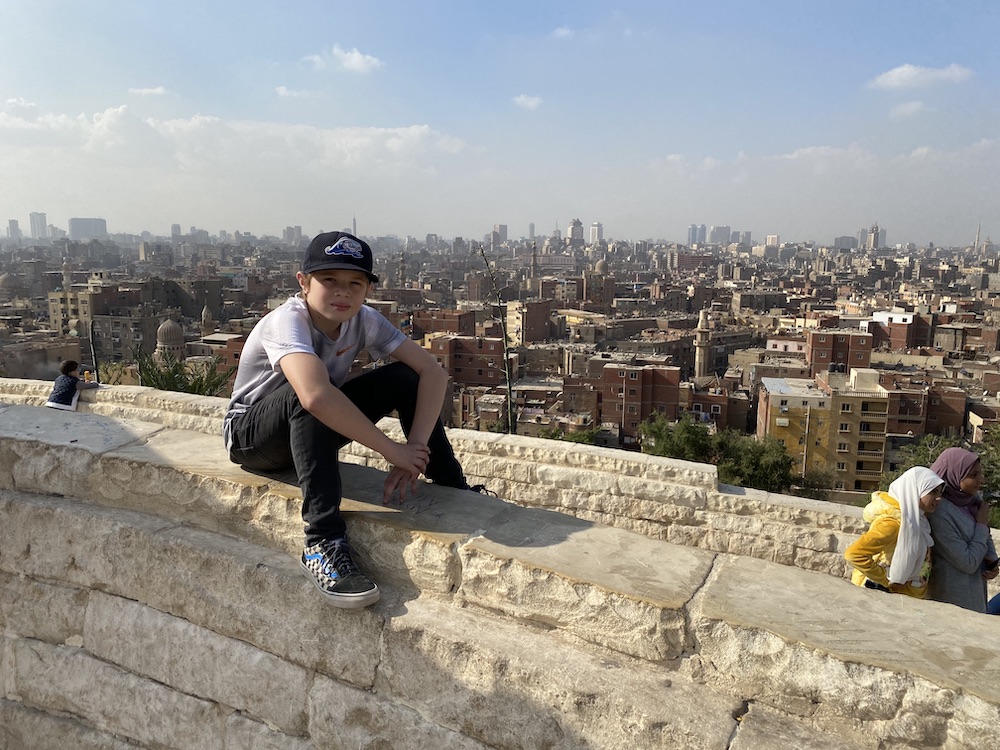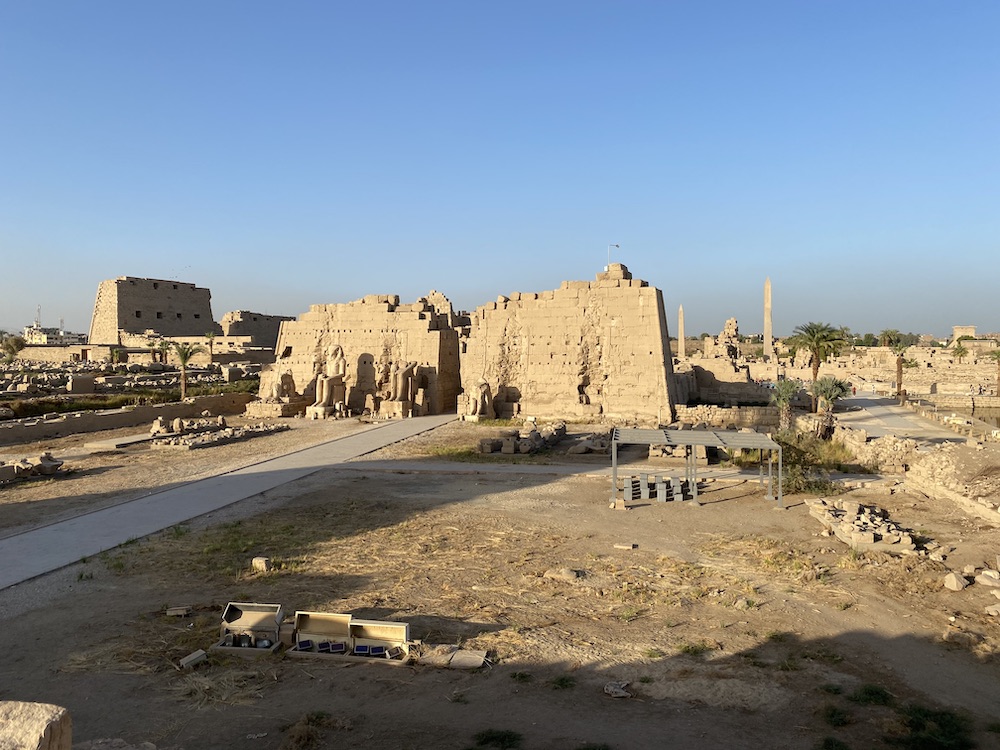
I am exhausted by tipping and the need of everyone here in the tourism industry to serve me just right so that I will give them a bigger tip. Everywhere I go, people are doing things for me, even though I am perfectly capable of doing it myself. Carrying my bag, getting me tea, sometimes just accompanying me so that I’m not alone for five minutes. It’s been a big adjustment for this self-service American.
Take for example this only slightly exaggerated scenario from the overnight train between Cairo and Luxor:
Train Steward: Sir, would you like some tea or coffee?
Me: Tea, please.
Steward: Excellent.
[Returns a few minutes later to my cabin with hot tea in an elegant glass with a tiny spoon]
Steward: Here you are, sir. And would you like sugar?
Me: Yes, please one sugar packet please.
Steward: Just one? Not more?
Me: No, just one.
Steward: [Plaintively] You sure? More?
Me: No. Really. One.
Steward: [Begging] More?
Me: Ok, two.
Steward: [Eyes raised, anticipating] Oh?
Me: [Sighing] OK, three.
Steward: [Excited, dumping in the sugar] Ah! Yes! Three! Three is good!
Now, the steward has served me well, giving me lots of sweet, sweet sugar for my tea, turning it into a syrupy goop, because he imagines foreigners just can’t possibly enjoy the taste of tea by itself. He will certainly get a bigger tip because of this, he is likely imagining.
I can’t tell if this kind of behavior is normal for the entire service industry, or if it’s because the tourism sector is still miniscule compared to what it once was in 2011 – before the revolution that knocked thirty-year president Hosni Mubarek out of power.
Our guides tell me November is a slow month anyway, and the high season in Luxor – which is basically entirely driven by antiquities tourism – gets three to four times as many people from January to March. But then, back before 2011, even in November, there would be ten times as many foreign visitors as there are now. Guides, stewards, hotels and shopkeepers need to work many times harder to get that foreign money than they used to.
It’s also hard to know exactly how much you should be tipping for things. A dollar equals fifteen or so Egyptian Pounds right now, but locally Pounds have so much more buying power, because the economy is so weak. For instance, I bought five amazing falafel in Cairo – a decent-sized lunch, for E£2.50. That’s basically fifteen-cents!
I’m told a driver from the airport should get about E£20. A guide for the day E£100. But then, how much to tip the officially-sanctioned train station guy (he wears a brass medallion) that picks up your luggage at the curb and brings it to the platform? How much for the train steward? How much for the man that hosts you in his home/guest house in a small town for lunch? It’s all very confusing, and sometimes I’m just flailing.
Another example that actually happened:
We were nearing the end of our tour of Luxor monuments, ending in the stunning Karnak Temple, a giant complex of many smaller temples. I had wandered off away from our guide and my family to look at things a bit closer. The star of Karnak’s show are the ten giant pylons, huge stone gates rising five and six stories in the air, covered with hieroglyphs and detailed carvings telling the accomplishments and stories of the individual pharaohs, such as Ramesess II and Queen Hasheput, who paid to build them.
I was passing through one of the pylons far from the temple center, gazing up, when a machine-gun toting security guard and a local man in a long, flowing gallibaya greeted me with a quick wave.
Guard: As-salamu alaykum. [Now smiling, in broken Engligh] Welcome! Where you from?
Me: America.
Guard: [Standing up] Ah! America number one!
Me: Yep. Sure.
Guard: [Jogging to get in front of me, frantically pointing at massive statues in front of current pylon we’re under] Hasheput in alabaster!
Me: Oh? Yeah. I guess. I suppose that is. [Not really, it seems like it’s red granite, but whatever.]
Guard: Come, come! Hasheput in alabaster!
Me: OK. [I walk a bit further along, following him.]
Guard: [Pointing at big, red granite statue] Hasheput in alabaster!
[It really is a good view at this point, and I’m about a hundred feet further down the path from the pylon. The next hulking pylon is another two hundred feet away. So, I stop to admire the statues and the dazzling light of the waning day draping the pylon.]
Guard: [He’s gone another fifty feet without me towards the next pylon, and is now off the path amongst a field of massive monument stones littering the ground.] Come! Come! Hasheput in alabaster!
Me: Huh. Ok. I suppose.
[I follow him. Now acutely aware that there’s nobody else around. His machine gun seems more menacing than it had been before.]
Guard: [Turning to me with a big smile.] Come! Come!
[We walk around to the side of the next pylon. This thing is huge, like the size of a four-story brick apartment building. We are scrambling over giant discarded stones next to it, where regular people just don’t seem to go. And then I see it.
There’s a door to the side of pylon, with a wooden gate. The guard, pushes it open.]
Guard: Come! Come!
[We walk up ancient stone steps through a narrow passageway, The steps are worn smooth. I am suddenly, acutely aware that this is all 4,500 years old. It seems like a temple scene from Conan the Barbarian. I follow the guard up through interminable darkness and emerge onto a stone platform on top of the pylon, affording an amazing view.]
Guard: You see? Panorama! [He makes a broad theatrical sweeping gesture. Then points to the granite statues in front of the last pylon.] Haseput in alabaster!
[This is some seriously great stuff. Standing atop the pylon, I furiously take photos and video of the area.]
Me: Wow. Yeah. This is great!
[Finished, I turn back to the guard, and he leads me back down the Conan stairs to the bottom. I’m thinking this is worth a good tip. I’m out of twenty-Pound notes, just a ten and a fifty. I pull out a fifty from my wallet and put it in my pocket. As we arrive, the other guy, a civilian, dressed in a gallibaya, ambles up.]
Guard: Yes, yes! Panorama! [He is now, clearly angling for a tip. I give it to him, and he not so discreetly peeks at the value, and seems very pleased.]
Guard: My friend. My friend!
[He is gesturing to the gallibaya guy, who also has his hands out. What the heck. I give him a ten, quickly pivot on my heel, and start to walk away, quickly, not looking back. Now, I hear the two of them arguing. Likely about the vastly different amounts I gave them both. They are following a short distance behind me, still arguing. I’m making as much speed back to the temple center as I can without running. I hear them still arguing from far away.]
-Scene-

In these situations, the power dynamic is uncomfortably clear for an American. What is the proper amount of tip to show respect without upsetting the balance? In another case, a train station luggage guy, who basically grabbed my suitcase from the cab without asking, was upset when I gave him E£10 at the platform. “What? This is just ten. It’s worth like, one dollar!” he said to me. I told him forget it, and the guy got even more upset at me. My guide at for that part of the journey, just pushed the luggage guy away cursing something in Arabic.
Did I do something wrong here? Or was it just a jerky luggage guy? I don’t know. Nobody will tell me, because the master-servant dynamic in Egypt is not set up for a truthful exchange of information.
Sitting in Cairo’s magnificent Al Azkhar Park yesterday with one of our guides, Ekramy, a sharp operator who I really came to like, we talked a bit about American personal interaction styles versus Egyptian.
“For Egyptians, there are many things that are better left unsaid. You just need to understand them,” Ekramy told me.
Americans, I told him, have trouble with that. For us, nothing has value unless it is spoken aloud.
Ekramy took this information in quietly. Thinking and looking into the distance.
Clearly, some things are better left unsaid.
It is all so complicated. An American could spend a lifetime here and still never really understand it all.
It’s our last day in Egypt today. We’re visiting the Islamic quarter of Cairo, the giant Khan el Khalili market, dinner with my sister and her family, and then off to the airport to catch a 1:00 a.m. flight back to Chicago. Miraculously, through the wonders of time zones, we leave Cairo at 1:00 a.m., connect through Abu Dhabi, and will manage to arrive in Chicago at 2:45 p.m. on the same day, Saturday. Sunday we’ll spend the day lying around the house, wondering if it all was actually real.